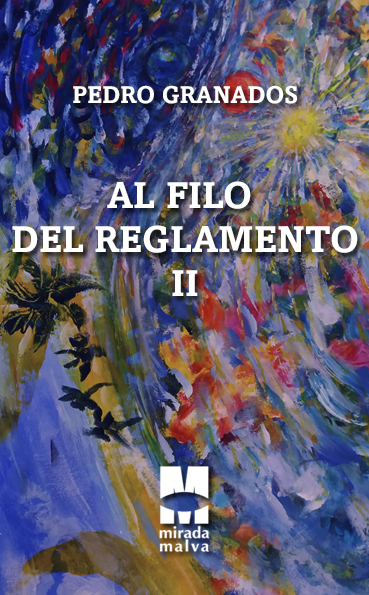Imagino que, un tanto al modo de Pound o de Eliot, y no menos de César Vallejo, me he detenido en lo siguiente:
Cualquier obra de arte es una mezcla de libertad y orden. Es perfectamente evidente que el arte oscila entre el caos, por un lado, y la pura mecánica, por otro. Una insistencia pedante en el detalle tiende a excluir la forma esencial. Si se mantiene con firmeza la forma esencial se hace posible una libertad en los detalles (Ezra Pound).
El arte es una evasión de posiciones fijadas; una oportuna evasión de una norma… (T.S.Eliot).
La técnica: pone siempre al desnudo lo que, en realidad, somos y adónde vamos (César Vallejo).
Digo un tanto porque, por otro lado, el mito en mi poesía no se halla pasteurizado, tal como sí sucede en Pound; también, aunque en apariencia luzca lo contrario, en Walt Whitman (“maestro de atletas” y curtido “hobo”) e incluso –alguien tan “cerebral” como Pound– en el autor de Altazor. Ambos, estos dos últimos, encandilados o casuales ante el chorro de sus propias imágenes (Imaginismo). Por cierto, pienso en un Vicente Huidobro en tanto intersección entre Whitman y Pound. Y, asimismo, concuerdo en lo que Octavio Paz piensa de Eliot: arte del palimpsesto de la tradición occidental o clásica. Por lo tanto, aquí también hallamos al mito ya fallecido; y sólo nos quedan de él citas o huellas. De modo análogo a lo que ocurre en Pound, insistimos: vórtice de ideas fusionadas y fusionantes, honesta voluntad de aura y de estilo.
Sin embargo, y por el contrario, en César Vallejo y compruebo que asimismo en mi poesía, el mito se da en bruto y está vivo; aunque no pretenda ser explícito ni, sería execrable, algo meramente decorativo. Es decir, el mito es acólito de sí mismo y crea archipiélago; aglutina, tal un real y activo agente, comunidad. En suma, ambiciona constituirse en un mediador conceptual amerindio overseas y transversal a cualquier lengua. Poesía que finalmente no oculta, sino más bien auspicia, una manera correcta o reparadora en su recepción. Una lectura, por ejemplo, de Trilce, y aunque resulte paradójico tratándose de un texto de “vanguardia”, más feliz que otras. Evado adrede, junto con lo que constituiría una lectura aleatoria o arbitraria de aquel poemario, el término “pertinente”; y, más bien, me remito a una recepción encarnada y post-antropocéntrica tanto de la poesía del autor de Trilce como de la mía. Vallejo no será Whitman, no intentará corroborar en su poesía las “ideas” de Rousseau; ni será Pound. Tampoco Eliot ni ningún “pequeño Dios”. Ni, aunque ambos “abolicionistas”, compartiría el “trascendentalismo” R. W. Emerson. Vallejo es un poeta sin membership, siendo el club de Pound, como sabemos, mucho más exclusivo que el de los 100 de Harold Bloom.
Y en español no escribo.
https://miradamalva.blogspot.com/2020/10/al-filo-del-reglamento-ii-poesia-de.html
I imagine that, somewhat in the manner of Pound or Eliot, and no less of César Vallejo, I have stopped at the following:
Any work of art is a mixture of freedom and order. It is perfectly evident that art oscillates between chaos, on the one hand, and pure mechanics, on the other. A pedantic insistence on detail tends to exclude essential form. If the essential form is firmly held, freedom of detail is possible (Ezra Pound).
Art is an escape from fixed positions; a timely evasion of a norm… (T.S. Eliot).
The technique: it always reveals what we really are and where we are going (César Vallejo).
I say somewhat because, on the other hand, the myth in my poetry is not pasteurized, as it is in Pound; also, although it seems otherwise, in Walt Whitman (“master athlete” and hardened “tramp”) and even – someone as “cerebral” as Pound – in the author of Altazor. Both, these last two, dazzled or casual before the stream of their own images (Imaginism). By the way, I think of a Vicente Huidobro as an intersection between Whitman and Pound. And I also agree with what Octavio Paz thinks of Eliot: palimpsest art from the Western or classical tradition. Therefore, here we also find the myth already deceased; and we only have quotes or traces of him. Analogously to what happens in Pound, we insist: vortex of fused and fusing ideas, honest will for aura and style.
However, and on the contrary, in César Vallejo and I verify that also in my poetry, the myth is given raw and is alive; Although it does not pretend to be explicit or, it would be execrable, something merely decorative. That is to say, the myth is an acolyte of itself and creates an archipelago; brings together, such a real and active agent, community. In short, it aspires to become an overseas Amerindian conceptual mediator and cross-sectional to any language. Poetry that finally does not hide, but rather supports, a correct or restorative way in its reception. A reading, for example, by Trilce, and although it is paradoxical in the case of an “avant-garde” text, happier than others. I purposely evade, together with what would constitute a random or arbitrary reading of that collection of poems, the term “pertinent”; and, rather, I refer to an embodied and post-anthropocentric reception of both the poetry of the author of Trilce and mine. Vallejo will not be Whitman, he will not try to corroborate Rousseau’s “ideas” in his poetry; nor will it be Pound. Neither Eliot nor any “little God.” Nor, though both “abolitionists”, would R. W. Emerson share “transcendentalism”. Vallejo is a poet without membership, being Pound’s club, as we know, much more exclusive than Harold Bloom’s 100’s.
And in Spanish I don’t write.

